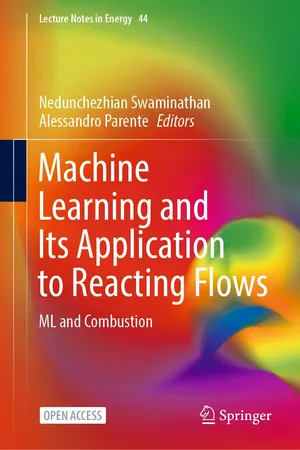
Machine Learning and Its Application to Reacting Flows
ML and Combustion
- English
- ePUB (mobile friendly)
- Available on iOS & Android
Machine Learning and Its Application to Reacting Flows
ML and Combustion
About this book
This open access book introduces and explains machine learning (ML) algorithms and techniques developed for statistical inferences on a complex process or system and their applications to simulations of chemically reacting turbulent flows.
These two fields, ML and turbulent combustion, have large body of work and knowledge on their own, and this book brings them together and explain the complexities and challenges involved in applying ML techniques to simulate and study reacting flows. This is important as to the world's total primary energy supply (TPES), since more than 90% of this supply is through combustion technologies and the non-negligible effects of combustion on environment. Although alternative technologies based on renewable energies are coming up, their shares for the TPES is are less than 5% currently and one needs a complete paradigm shift to replace combustion sources. Whether this is practical or not is entirely a different question, and an answer to this question depends on the respondent. However, a pragmatic analysis suggests that the combustion share to TPES is likely to be more than 70% even by 2070. Hence, it will be prudent to take advantage of ML techniques to improve combustion sciences and technologies so that efficient and "greener" combustion systems that are friendlier to the environment can be designed.
The book covers the current state of the art in these two topics and outlines the challenges involved, merits and drawbacks of using ML for turbulent combustion simulations including avenues which can be explored to overcome the challenges. The required mathematical equations and backgrounds are discussed with ample references for readers to find further detail if they wish. This book is unique since there is not any book with similar coverage of topics, ranging from big data analysis and machine learning algorithm to their applications for combustion science and system design for energy generation.
Frequently asked questions
- Essential is ideal for learners and professionals who enjoy exploring a wide range of subjects. Access the Essential Library with 800,000+ trusted titles and best-sellers across business, personal growth, and the humanities. Includes unlimited reading time and Standard Read Aloud voice.
- Complete: Perfect for advanced learners and researchers needing full, unrestricted access. Unlock 1.4M+ books across hundreds of subjects, including academic and specialized titles. The Complete Plan also includes advanced features like Premium Read Aloud and Research Assistant.
Please note we cannot support devices running on iOS 13 and Android 7 or earlier. Learn more about using the app.
Information
Table of contents
- Cover
- Front Matter
- Introduction
- Machine Learning Techniques in Reactive Atomistic Simulations
- A Novel In Situ Machine Learning Framework for Intelligent Data Capture and Event Detection
- Machine-Learning for Stress Tensor Modelling in Large Eddy Simulation
- Machine Learning for Combustion Chemistry
- Deep Convolutional Neural Networks for Subgrid-Scale Flame Wrinkling Modeling
- Machine Learning Strategy for Subgrid Modeling of Turbulent Combustion Using Linear Eddy Mixing Based Tabulation
- On the Use of Machine Learning for Subgrid Scale Filtered Density Function Modelling in Large Eddy Simulations of Combustion Systems
- Reduced-Order Modeling of Reacting Flows Using Data-Driven Approaches
- AI Super-Resolution: Application to Turbulence and Combustion
- Machine Learning for Thermoacoustics
- Back Matter